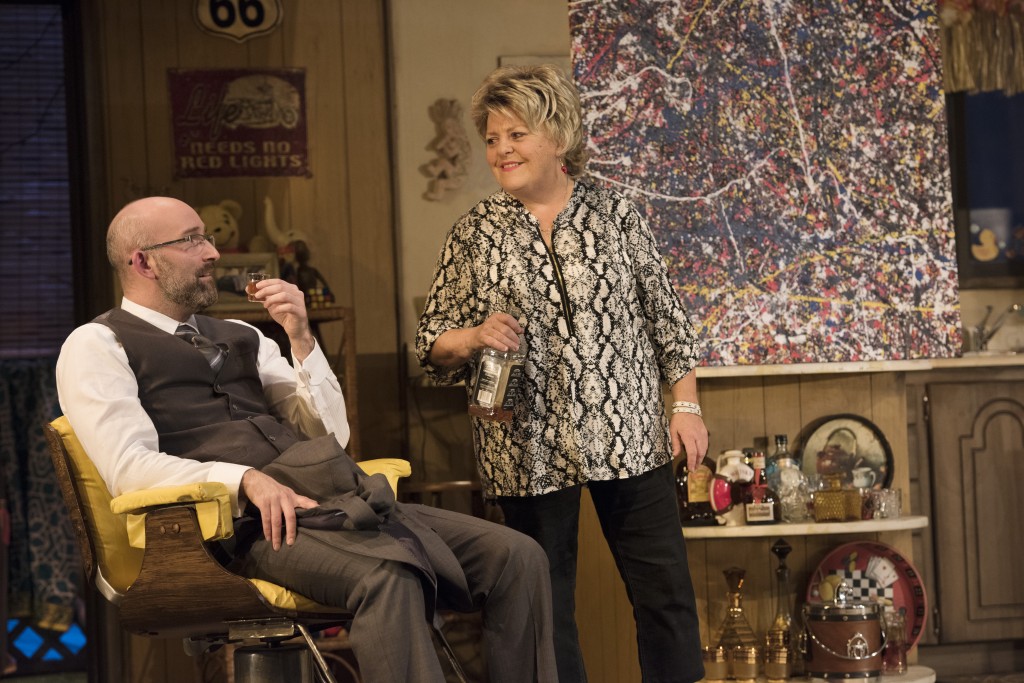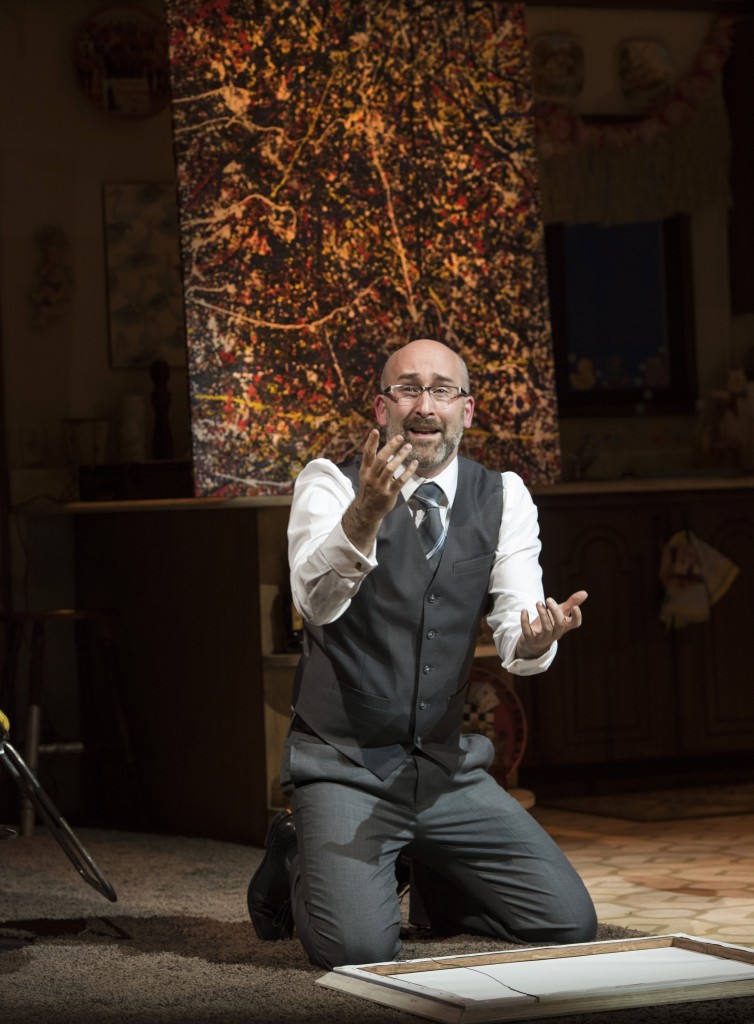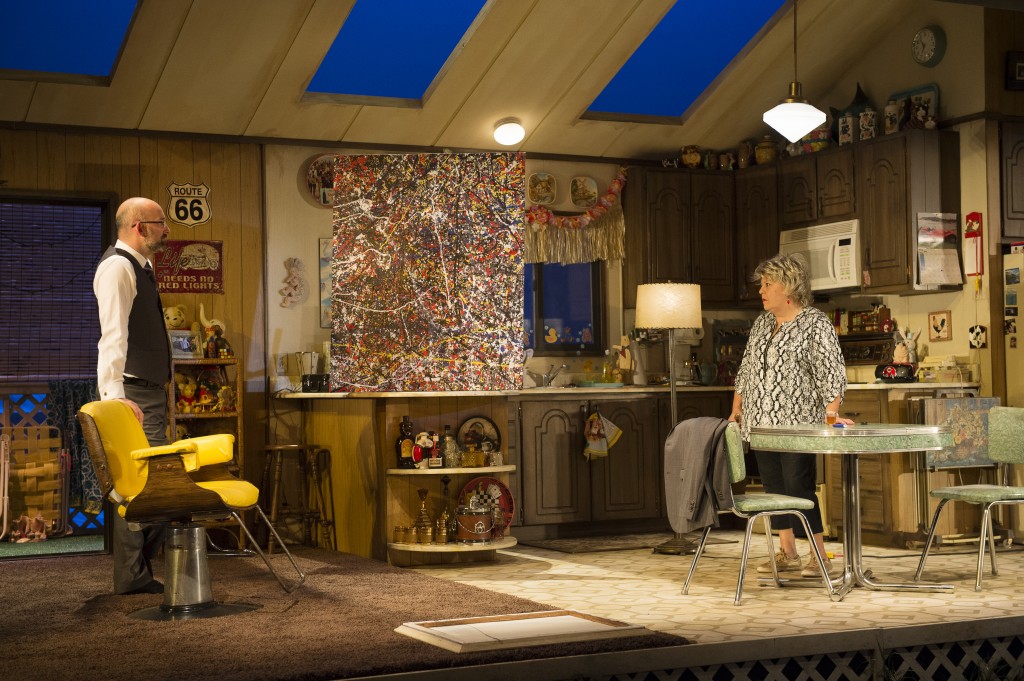
Credit: David Cooper
At The Stanley until November 20, 2016
604-687-5315/artsclub.com
Posted October 27, 2016
There’s a gift waiting for you at The Stanley and it’s Nicola Cavendish. She’s simply a knockout in Stephen Sachs’ Bakersfield Mist in spite of – or possibly because of – being more foul-mouthed and brash in a role than you’ve ever seen her before. There’s a gasp from the audience followed by roars of laughter when Cavendish, as Maude Gutman, offers oral sex to the snooty art expert Lionel Percy (Jonathan Monro). Her advances rejected by a horrified Percy (“You’re drunk”, he says), Maude snorts, “I wouldn’t smoke your pipe if I was sober.” How naughty is that?
Cavendish, in her sixties, is as ballsy and gutsy as ever. But she goes both ways; in the most intimate moments of Bakersfield Mist, her f-bombing Maude tugs at your heartstrings.
Bakersfield Mist – the title comes from Jackson Pollock’s Lavender Mist – is criticized for being too ‘binary’ or to ‘polarized’ and it’s true: the playwright sets poorly-educated, out-of-work bartender, trailer park-dwelling Maude up against Percy, an uptight, patronizing, former director of New York’s Metropolitan Museum of Art. We are invited to view her as authentic and salt-of-the-earth, and him as condescending, class conscious, pretentious and full of himself. But it’s not that simple and Cavendish, Monro and director Roy Surette mine the script for humanizing nuances that make it difficult to see Percy as merely a contrivance for talking about authenticity – aesthetic and personal. Percy has some ‘real’ moments.
Set designer Pam Johnson gives Maude the perfect place to live; a trailer packed full of thrift store finds, there’s not a square inch of uncluttered counter space. Shock at Maude’s surroundings is written all over Percy’s face when he arrives to assess the authenticity of a painting, a five dollar purchase that just might be a Jackson Pollock worth millions of dollars.
If – and it’s a big if – it’s the real thing, “How much is it worth? How much? How much?” Maude brays. When Percy refuses, at first, to take a guess, Maude encourages him, “Be a person. Be a person”.
The play tells us Maude is a person; Percy, not so much, although when Monro delivers what is really a lover’s aria to Jackson Pollock and goes into almost orgasmic delight describing Pollock’s method of drizzling, hurling, pouring paint on the canvas, Percy is definitely “a person”.

Credit: David Cooper
Cavendish and Monro work Sachs’ script like artists building up the layers, illuminating this element, then that until it all comes together. From the beginning we love Maude but it takes work on Monro’s part to get sympathy for Percy. In bits and pieces, he gets there and in his final assessment of the painting and of Maude, he delivers the line with tremendous generosity.
The playwright does not go to some places that would have made Bakersfield Mist deeper and more satisfying. He gives Maude a rich backstory that explains her obsession and passion for the painting whether it’s authentic or not and, to some extent, the reason for her refusal to sell it. ‘It’s not about money”, she says – although that doesn’t completely explain exactly why she has borrowed money from her brother to bring Percy from New York to Bakersfield, California to assess the painting. “It’s about the truth”, she says.
Percy, however, has little history apart from all the prestigious postings he’s had over the course of his career. This lack lures us into dismissing him as a prig and a stuffed shirt – although his passion for Pollock suggests there’s a beating heart in there somewhere.
Quibbles aside, it’s a lovely, thoroughly entertaining night at the theatre. Presented by the Arts Club Theatre, it’s an opportunity to watch Cavendish twist an entire audience around her little finger so that every gesture, every facial expression and every word resonates. The thrift store painting may or may not be authentic, but Cavendish certainly is.

Credit: David Cooper

